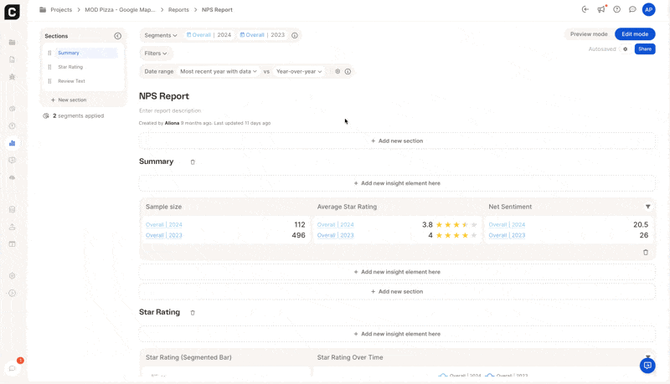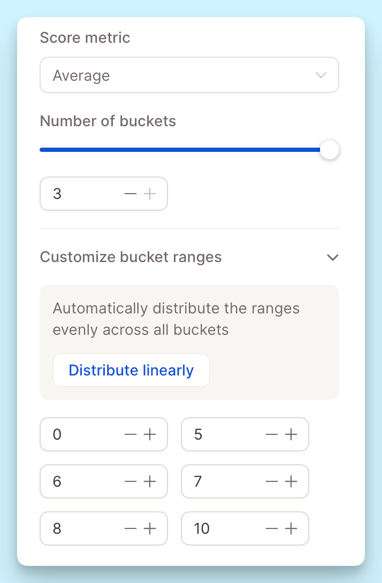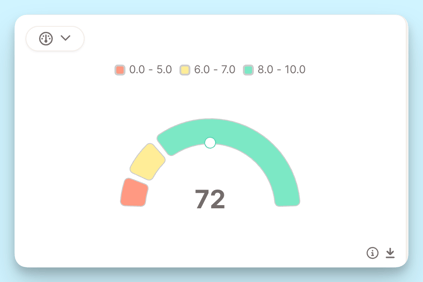Understanding Scores
Understand and visualize your key metrics: from NPS to Star Ratings
Caplena provides several ready-to-use Score / Rating elements that help you evaluate and visualize how your customers feel about your products, services, or experiences.
This article explains each score type and how to interpret them in your reports.
Where to Find Scores
All score-related insights are located under Score / Rating in the report editor.
You’ll find the following elements:
Each can be added to your report and customized to display your chosen numerical column.

Key Metrics Overview
The Key Metrics Overview provides a quick snapshot of your project’s main metrics. You can use it to get an instant understanding of overall trends without diving into detailed charts.

This example shows:
-
Sample size – total number of responses included (e.g., 112)
-
Average Star Rating – average of all star ratings in your dataset (e.g., 3.8 ⭐)
-
Net Sentiment – percentage balance of positive versus negative feedback (e.g., +20.5)
When adding the Key Metrics Overview element, you can select which numerical metric to display (e.g., Star Rating, NPS Score).
You can also choose a Text to analyze column,this determines which responses the metrics are based on.
💡 Tip:
If you leave Text to analyze blank, Net Sentiment won’t be shown.
This is ideal for non-sentiment projects.
NPS Score
The Net Promoter Score (NPS) helps you measure customer loyalty by grouping respondents into:
-
Promoters (9–10)
-
Passives (7–8)
-
Detractors (0–6)

You can visualize:
-
NPS Score Gauge – your overall score
-
NPS Over Time – trends across months or quarters
Formula:
NPS = % Promoters − % Detractors
Generic Score
The Generic Score element lets you visualize any numeric rating in your dataset, for example, satisfaction, quality, or agreement levels, even if your question isn’t a classic NPS one.

How to customize it
Click the ⚙️ icon in the top-right corner of the element to tailor how your score is calculated and displayed.
Here’s what you can adjust:
-
Score metric – choose how you want Caplena to calculate the score:
-
Average → shows the average of all numeric values
-
NPS → calculates Net Promoter Score from 0–10 ratings
-
Top 1 / Top 2 Buckets → percentage of responses in the top rating groups
-
Bottom 1 / Bottom 2 Buckets → percentage of responses in the lowest rating groups
-
-
Number of buckets – define how many segments you want on the gauge (for example, 3 for red, yellow, green).
-
Bucket ranges – adjust the numeric ranges for each segment manually, or click Distribute linearly to let Caplena space them evenly.
Understanding “Buckets”
Buckets divide your rating scale into colored segments, such as:
-
0–5 → red
-
6–7 → yellow
-
8–10 → green
Each bucket represents a group of responses within that range.
When you select metrics like Top 1 Bucket, Caplena shows the share of responses in the highest range (e.g., 72% rated 8–10).

Star Rating
The Star Rating element visualizes ratings on a 1–5 scale, often used for:
-
App reviews
-
Product ratings
-
Service feedback

The element includes two parts:
-
Star Rating Breakdown — shows how ratings are distributed (e.g., how many 1⭐, 2⭐, 3⭐, etc.)
-
Star Rating Over Time — tracks how the average star rating changes across months or quarters
Together, they help you quickly spot shifts in customer satisfaction and identify periods of improvement or decline.
